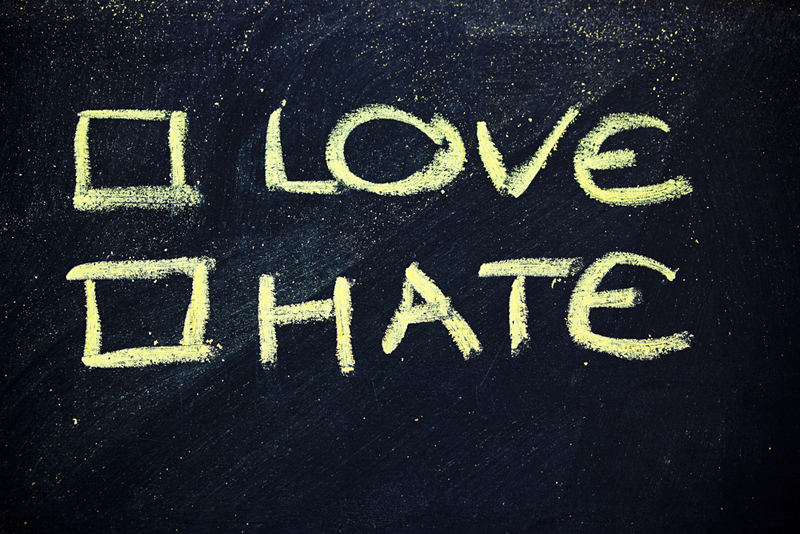Haters Gonna Hate? Why Some People Dislike Everything

Get the world’s most fascinating discoveries delivered straight to your inbox.
You are now subscribed
Your newsletter sign-up was successful
Want to add more newsletters?

Delivered Daily
Daily Newsletter
Sign up for the latest discoveries, groundbreaking research and fascinating breakthroughs that impact you and the wider world direct to your inbox.

Once a week
Life's Little Mysteries
Feed your curiosity with an exclusive mystery every week, solved with science and delivered direct to your inbox before it's seen anywhere else.

Once a week
How It Works
Sign up to our free science & technology newsletter for your weekly fix of fascinating articles, quick quizzes, amazing images, and more

Delivered daily
Space.com Newsletter
Breaking space news, the latest updates on rocket launches, skywatching events and more!

Once a month
Watch This Space
Sign up to our monthly entertainment newsletter to keep up with all our coverage of the latest sci-fi and space movies, tv shows, games and books.

Once a week
Night Sky This Week
Discover this week's must-see night sky events, moon phases, and stunning astrophotos. Sign up for our skywatching newsletter and explore the universe with us!
Join the club
Get full access to premium articles, exclusive features and a growing list of member rewards.
"Nah," "eh," "no" and "ugh": These are the familiar sounds of people who don't seem to like much and conjure negative quips for just about anything. While people with more positive dispositions may try to shake enthusiasm unto these downers, new research helps to explain why this often doesn't work.
That certain people like more things than others may seem obvious, but, until now, nobody has ever tested whether such dispositions operate as distinct personality traits, separate from other traits such as optimism/pessimism or extroversion/introversion. A team of researchers from the University of Illinois at Urbana-Champaign and the University of Pennsylvania have now conducted the first quantitative analysis of dispositional attitude, finding that it is, in fact, distinct from these other traits.
"Optimists tend to have generalized beliefs usually about the future, such as 'Things are going to turn out well,'" said Justin Hepler, a professor of psychology at the University of Illinois at Urbana-Champaign and an author on the study. "We were interested in whether people liked or disliked things, in general, and had people report their attitude about different things." [7 Personality Traits That Are Bad for You]
Debbie downers
The researchers started with a sample of 1,300 people, and a list of 200 unrelated items, including mullets, sea salt, T-shirts and extinction. They ultimately narrowed down their list to 16 items, and continued their study to include a total of 2,000 participants.
The study subjects — including undergraduate students from the University of Illinois and a broader demographic gathered from an Amazon.com survey service — rated items on the list from 1 to 7, with 1 representing "extremely unfavorable" and 7 representing "extremely favorable." Subjects also completed other surveys that tested for potentially overlapping traits, such as optimism/pessimism and extroversion/introversion.
The researchers found that people's dispositional attitudes often correlated with other similar traits, but were still statistically distinct, meaning that some optimists have a tendency to dislike many things, and some pessimists, likewise, might like lots of things.
Get the world’s most fascinating discoveries delivered straight to your inbox.
As with all personality traits, dispositional attitudes develop through a combination of one's biology and environment. The team has not yet assessed how therapy could help mediate these traits, but suggests that adjusting one's external stimuli, such as surrounding oneself with positive people, could ultimately sway a person from one side of the spectrum to the other.
Turning a frown upside down
These findings could potentially help people with strongly negative or positive dispositions become aware of their own role in their attitude toward things, and separate this from the inherent quality of those things. For example, a person with a negative disposition might read reviews before watching a movie, focus only on negative reviews, and end up not enjoying the movie either because they were influenced by the negative reviews or simply see themselves as contrary people. Becoming aware of this tendency may help that person assess movies or other things more objectively, Hepler explained.
The team plans to conduct follow-up studies to more closely examine how this distinct personality trait influences behavior.
"If you like something, you are more likely to do it — there's no surprise there," Hepler said. "When you combine that with the fact that some people have a tendency to like a lot of things, some people might just do more things overall."
Participating in more activities could create a feedback loop in which people feel stimulated and enjoy more things, though this idea was not assessed in the study, Hepler said. The team also did not assess the correlation between depression and negative dispositions, but they hope to address this in future research.
The findings were published earlier this month in the Journal of Personality and Social Psychology.
Follow Laura Poppick on Twitter. Follow LiveScience on Twitter, Facebook and Google+. Original article on LiveScience.

 Live Science Plus
Live Science Plus










